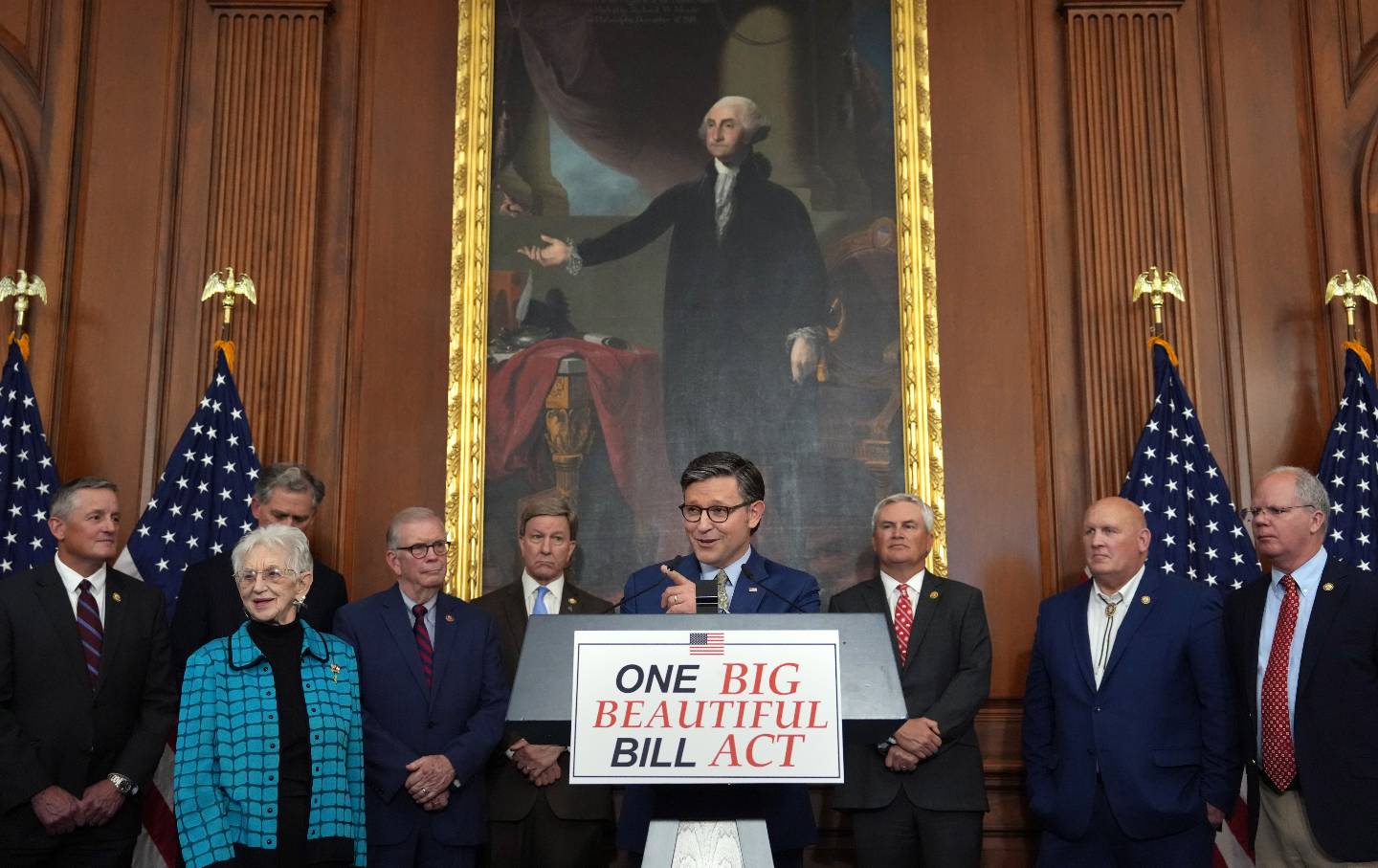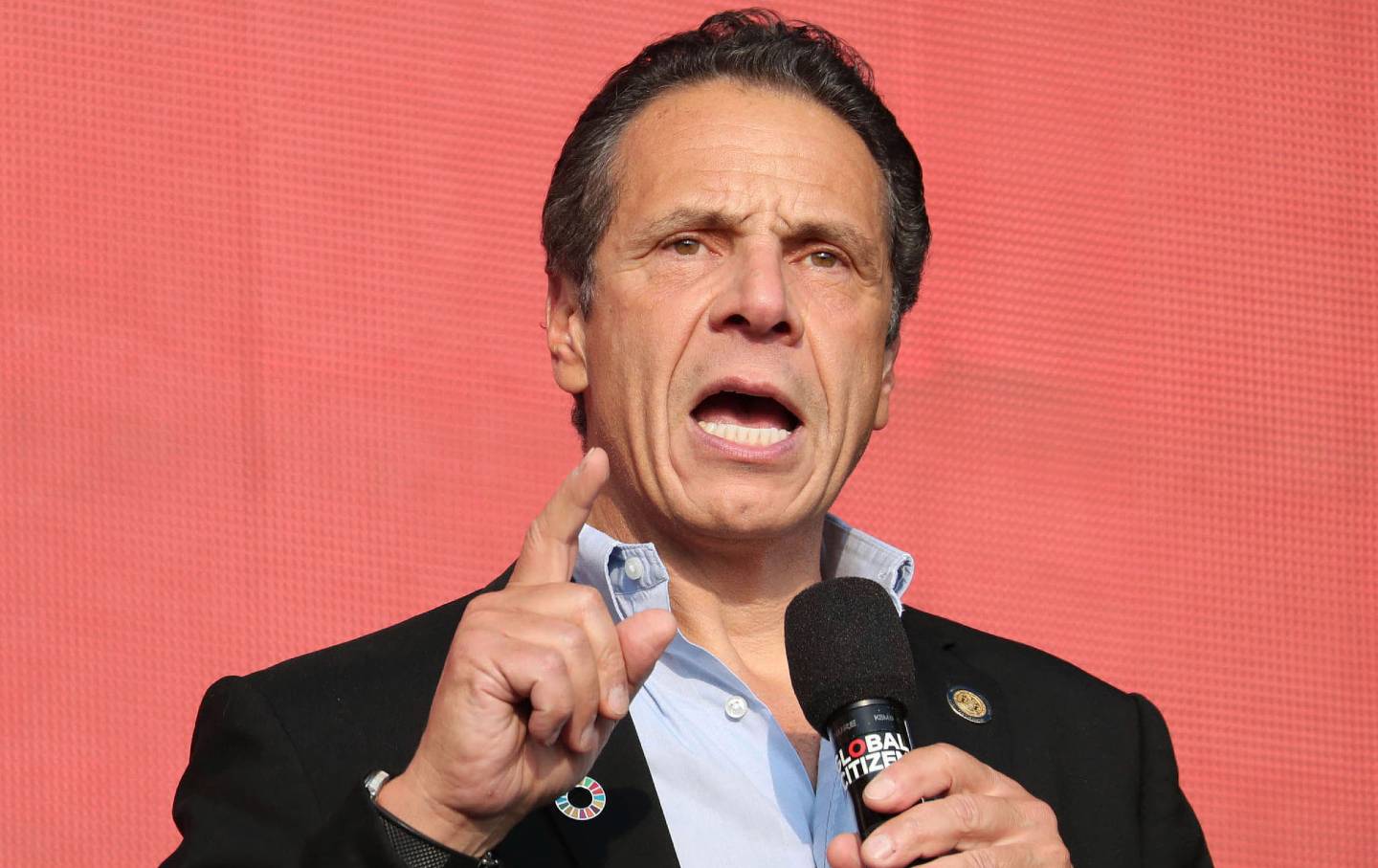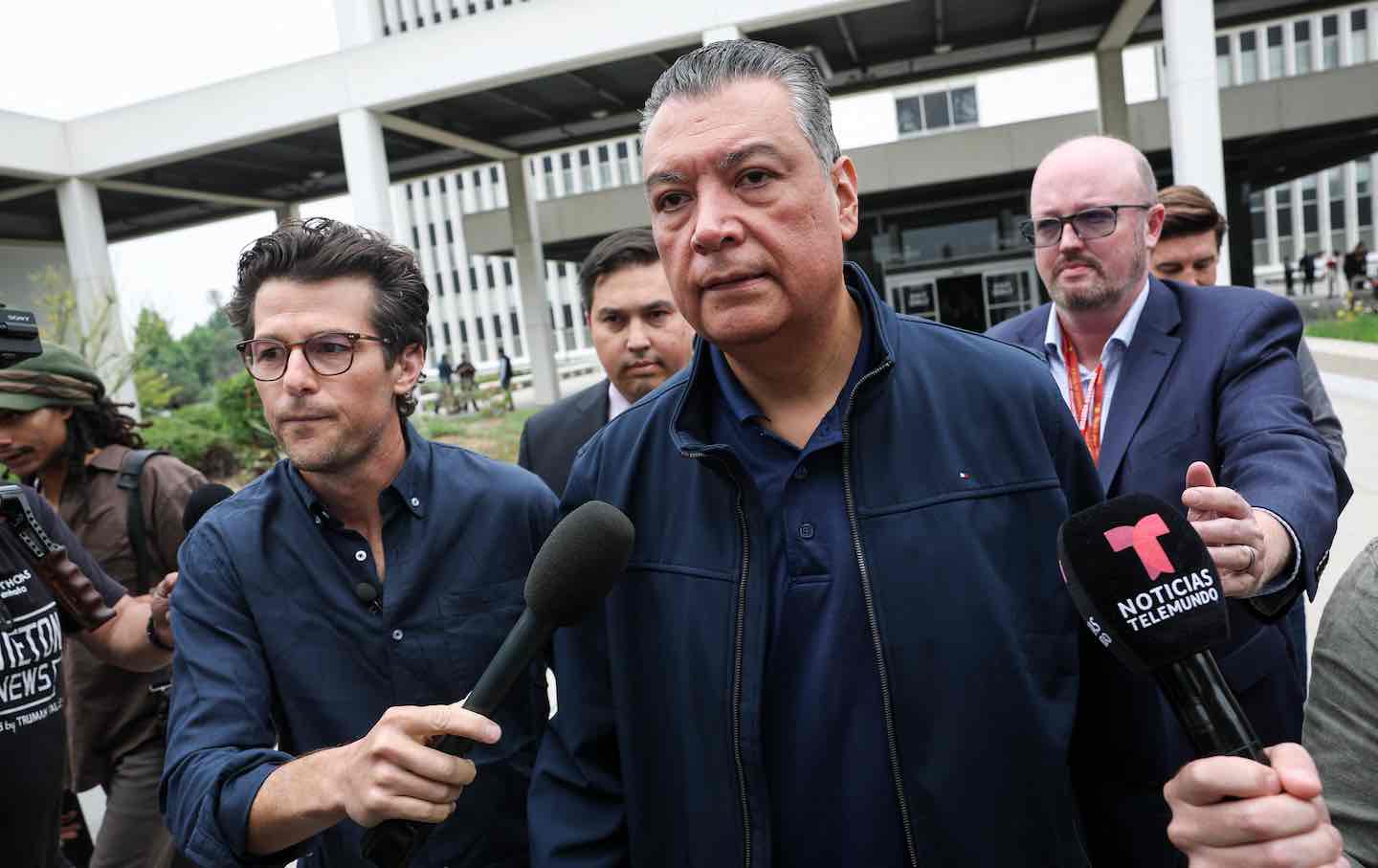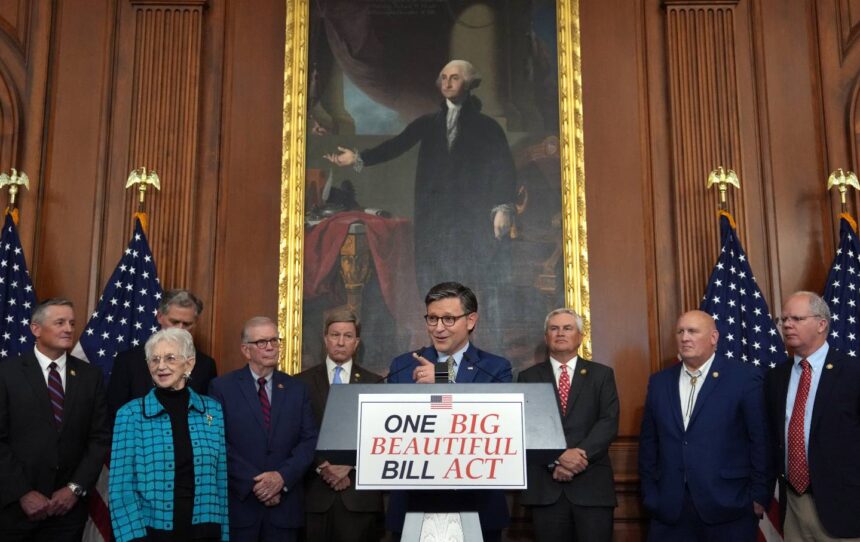Politics
/
StudentNation
/
June 16, 2025
The proposed “One Big, Beautiful Bill Act” will slow the progress of the next generation for years to come. Here are three of the biggest consequences.

Speaker of the House Mike Johnson speaks to the media after the House narrowly passed a bill forwarding President Donald Trump’s agenda.
(Kevin Dietsch / Getty)
The “One Big Beautiful Bill Act” notably includes cuts to Medicaid, SNAP, education, and environmental programs, all while providing greater tax relief for the ultra-wealthy and big corporations. If the proposed budget bill passes the Senate, young people and students may have the most to lose.
The OBBBA passed the House of Representatives on May 22, by one vote (215–214) and is currently being debated in the Senate. As the Senate deliberates potential amendments to the bill, there is a slim window for opposition: Trump posted to social media urging Senators to pass the bill before July 4.
The bill, sprawling at 1,000 pages, proposes changes that will touch all generations, with low-income and marginalized communities expected to feel the brunt of these cuts the most, from seniors whose Medicare is now in jeopardy, to families who no longer will be able to access nutrition assistance and the Children’s Health Insurance Program for their children. The youngest generations, of course, will feel the effects for years to come.
I spoke with young organizers, activists, and experts who explained how the bill specifically hurts young people and students and its anticipated consequences.
Health and Mental Health
One of the most contentious elements of the bill is its proposed changes to Medicaid, including introducing stricter work requirements and additional hurdles. It is estimated that these proposed changes would cause more than 13.7 million people, many of whom are students and young people, to lose their health insurance.
Current Issue

Cutting Medicaid funding would also endanger millions of young people’s access to critical mental health services, including outpatient therapy, crisis care, and medication. This is pertinent, as young people are experiencing higher rates of depression, especially those who entered high school or college during the pandemic.
As Hannah Wesolowski, chief advocacy officer at the National Alliance on Mental Illness, explained: “The budget bill, in the House-passed version, would cut nearly $800 billion from Medicaid. Medicaid pays for one in four dollars spent on mental health and substance use care in this country. Cuts of this magnitude will have a significant and direct impact on people receiving Medicaid as well as a ripple effect on the entire US healthcare system.… Half of mental illnesses first appear by age 14, and 75 percent by age 24. We know that keeping people covered during this crucial period is vital to early intervention to help young people exhibiting early symptoms get the right care and be able to continue with their education or early careers.”
Additionally, youth organizers highlight the impact of this bill on LGBTQIA+ youth: “The budget bill passed by the House scapegoats the LGBTQIA+ community to fund tax cuts for billionaires and militarization that harms our communities,” said Ranen Miao, 24, who is a cofounder of OutVote, a youth civic engagement organization focused on the LBGTQIA+ community. The bill also includes eliminating the 988 Suicide & Crisis Lifeline for LGBTQIA+ youth, a “ban on federal funding for life-saving gender-affirming healthcare through Medicaid and CHIP, removing gender-affirming healthcare as an essential health benefit, and massive cuts to Medicaid and SNAP, which will disproportionately harm LGBTQIA+ young people.”
Education and College Access
The bill would provide significant barriers to young people pursuing higher education, with cuts proposed to federal student aid programs. Key provisions of the bill include a reduction of the maximum Pell Grant award and an increase in the credit requirement for full-time enrollment from 12 to 15 credits per semester. According to the nonpartisan Congressional Budget Office, these proposed changes would result in more than half of current Pell Grant recipients receiving reduced aid, and approximately 10 percent losing eligibility entirely because of their being enrolled in fewer than six credit hours per semester.
The bill also proposes the elimination of subsidized federal student loans, starting July 1, 2026. This would mean that all undergraduate federal borrowing would accrue interest while students are still enrolled, increasing student debt burdens.
“Young people are already struggling under the weight of student debt and rising prices. Decreasing aid is only going to stunt young people’s growth even further, halting the pipeline for future careers,” said 19-year-old Chetan Soni, the executive director of Washington Youth Alliance and a current student at the University of Washington.
“Rather than investing in the next generation, the bill imposes deep cuts that specifically target young people. These disastrous changes to higher education make student loan debt a life sentence, especially for low-income and first-generation students who were told that education was the key to stability,” said Kate Londen, communications director at Young Invincibles. “If Congress can find billions to bail out massive corporations when they make poor financial decisions, why is it ‘too expensive’ to cancel student debt or expand aid for young people who played by the rules, earned degrees, and took on loans in good faith?”
Jobs and Economic Mobility
Currently, more than four in 10 young Americans under 30 say they’re “barely getting by” financially, according to the recent Harvard Youth Poll. This budget bill would only further exacerbate young people’s economic insecurity. “Young people cannot advance their careers when they don’t have enough to eat, can’t see a doctor when they are sick, or cannot pay for their basic needs,” Megan Evans, senior government affairs manager at the National Skills Coalition, said in response to changes to programs such as SNAP and Medicaid.
The bill also proposes cutting workforce training initiatives, including programs that provide critical job training, apprenticeships, and employment support for young people like Job Corps, YouthBuild, and the Workforce Innovation and Opportunity Act youth services. These programs are especially critical in serving low-income, out-of-school, and justice-involved youth.
Cutting programs focused on climate action in industries such as solar, wind, and electric vehicles will also adversely impact young people who are more passionate about addressing climate change than older generations and have already begun pursuing training for “green jobs.” This bill “eliminates tax credits and grant programs that support clean energy and infrastructure projects and are estimated to create 2.65 million jobs annually.” Evans continued. “Cutting programs and investments will not help students and young people. It’s also opposite to what young people want the government to do. In a poll released last year, 85 percent of young adults said they support government funding for skills training.”
Although the bill expands Workforce Pell Grants for short-term training, Evans argued that this will not substitute for job support services that young people need to achieve economic mobility and advance into long-term careers.
What’s Next?
Advocates continue to hope that the bill’s most harmful elements for young people will be removed through organized advocacy efforts.
“This bill has not been passed by the Senate and has not been enacted into law yet. We still believe that advocacy can impact the final version of this bill, and we will continue to advocate to minimize the provisions we are most concerned about, particularly cuts to Medicaid,” Wesolowski said. Cutting healthcare for older generations, such as seniors, may also have lasting downstream effects on younger generations who may have to make up for gaps in coverage and take on care-giving roles for older family members in the future.
Popular
“swipe left below to view more authors”Swipe →
NAMI is one of the many organizations encouraging people to continue to reach out to their elected representatives to hold them accountable. For example, NAMI advocates have sent “more than 125,000 letters to Congress on the importance of Medicaid this year alone, and have made thousands more calls to their members of Congress,” Wesolowski said.
Young Invincibles also shared their concern that the bill could go even further in harming young people. “It seems that the Republicans are far away from consensus on this bill, but the senators making the loudest noise about it all want the bill to cut even more from essential programs,” said Londen. “If this bill does make it out of the Senate, there is a good chance it will become even more cruel for young people. We have to keep showing what a bad deal this bill is for anyone who is not a billionaire or a corporate CEO.”
In addition to continuing to pressure Congress as the Senate continues its debate around the bill, youth organizers are looking at the bill as a way to catalyze more civic engagement beyond the federal legislative process, hoping it can inspire more local action. “To ensure structural change, make sure you’re registered and ready to vote for candidates who support our generation, including the rights and dignity of our LGBTQIA+ community: there are upcoming local and statewide elections that will be critical in setting the agenda for local races,” Miao said.
Looking forward, Trump’s budget bill could reverse gains in the younger generation’s upward mobility and ability to thrive into adulthood for decades to come. “This bill is about who gets to succeed in this economy,” Evans said. “This budget package makes it clear that the needs of students and workers are not a priority to this Congress.”
More from The Nation


Cuomo claims that “housing is a top priority.” A dig into his track record says something very different.
Tracy Rosenthal

A mural in Oaxaca honoring the disappeared women.
OppArt
/
URTARTE

After law enforcement assaulted Senator Alex Padilla, we know: We are the only guardrails. Show up at a “No Kings” rally Saturday.
Joan Walsh

Americans have a right to assemble and a right to petition for the redress of grievances. They will use those rights this weekend to resist Trumpism.
John Nichols









